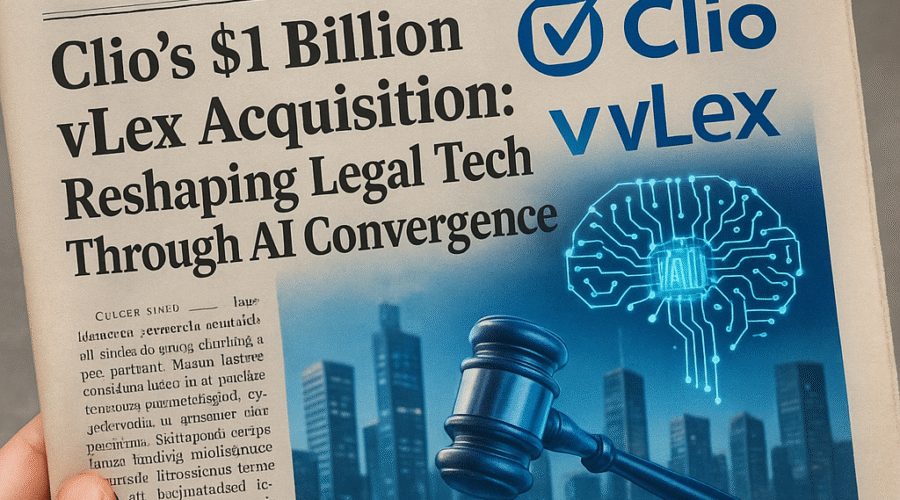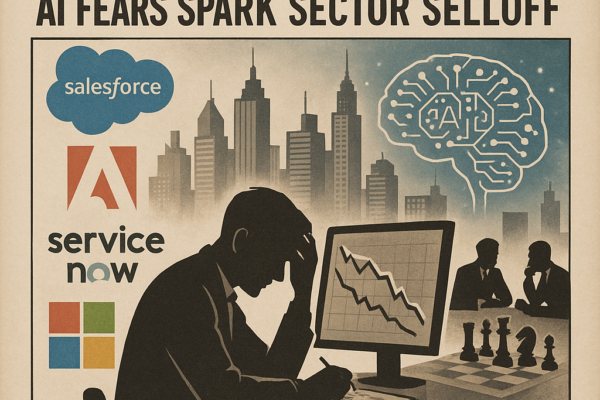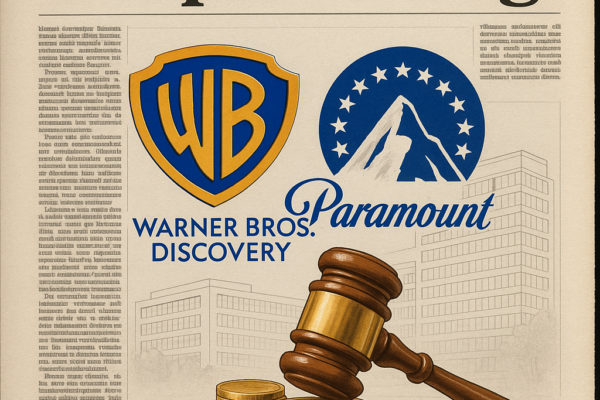In a landmark transaction that signals tectonic shifts in legal technology, Clio has announced its definitive agreement to acquire vLex for $1 billion in cash and stock[1][2][5][10][11][12][15][16]. This deal represents the largest acquisition in legaltech history and creates an unprecedented convergence of practice management and legal intelligence capabilities[6][11][15]. By merging Clio’s dominant legal operating system—used by over 200,000 professionals—with vLex’s AI-powered research platform and its billion-document legal database, the transaction establishes a new category of intelligent legal technology that fundamentally redefines how law will be practiced in the AI era[5][6][9][10][11]. The strategic implications extend beyond mere market consolidation, positioning the combined entity to challenge Thomson Reuters and LexisNexis while accelerating the development of agentic AI workflows that could automate core legal functions[9][11][13][16].
💼 Seasoned CorpDev / M&A / PE expertise
Deal Architecture and Financial Engineering
Transaction Mechanics and Valuation Metrics
The $1 billion consideration combines cash and equity, with Wilson Sonsini Goodrich & Rosati providing legal counsel to Clio on the transaction[2][10]. This valuation represents a 4% net asset value uplift for Oakley Capital, vLex’s private equity owner since 2022[14]. The deal’s structure reflects Clio’s robust financial position following its $900 million Series E funding round in 2024, which valued the company at $3 billion and provided ample capital for strategic acquisitions[11][13][16]. Notably, the transaction marks one of the few billion-dollar exits for a Spanish technology company and stands as Canada’s largest private tech acquisition[11][15]. Regulatory approvals remain pending, with closing anticipated later in 2025[2][10].
Capitalization Strategy and Ownership Transition
Clio’s payment structure—blending cash and stock—enables retention of vLex’s leadership team while aligning long-term incentives[5][10]. This approach mirrors sophisticated tech M&A strategies where stock components preserve acquisition currency for future deals[13]. The transaction transitions vLex from Oakley Capital’s portfolio to Clio’s expanding ecosystem, following vLex’s own acquisition of Fastcase in 2023 that first signaled its consolidation ambitions[11][15]. Financial disclosures reveal Clio now generates approximately $300 million in annual recurring revenue (ARR) excluding vLex, representing 50% year-over-year growth from its 2024 baseline[12][16].
Strategic Rationale and Market Positioning
Convergence of Legal Technology Silos
The acquisition strategically dismantles traditional boundaries between the “business of law” (practice management, billing, client intake) and “practice of law” (research, drafting, case analysis)[9][11]. As Clio CEO Jack Newton articulated, “AI is driving a deep convergence of these historically discrete universes”[9]. This integration creates what industry analysts describe as legaltech’s first end-to-end platform capable of handling both operational workflows and substantive legal work within a unified environment[11][15]. The combined entity now controls critical infrastructure spanning matter management (Clio), global legal research (vLex), and AI-powered drafting/analysis (Vincent AI)[4][8][10].
Data as Defensible Moat in AI Competition
vLex’s crown jewel—its proprietary database of over 1 billion legal documents enriched with editorial metadata—provides the training foundation for next-generation legal AI[4][8][10][16]. This dataset represents what Clio’s CEO describes as “one of the only long-term defensible competitive moats” in legal technology[16]. Unlike generic large language models, Vincent AI leverages jurisdiction-specific legal materials updated daily, enabling precise citation and analysis grounded in authoritative sources[8][10]. The database’s global coverage across 110 countries and 50 U.S. states creates immediate competitive advantages in cross-border matters and multi-jurisdictional research[4][10][11].
Technology Integration and AI Roadmap
Vincent AI: The Engine of Transformation
At the core of the acquisition’s value proposition is vLex’s Vincent AI platform, recently awarded the American Association of Law Libraries’ New Product Award[8][10]. Vincent distinguishes itself through multimodal capabilities including audio/video analysis, legal theory testing, and customizable firm workflows[8][10]. Unlike competitors, it provides transparent links to primary sources and tracks judicial treatment through expert legal editors[8][10]. The AI’s architecture combines generative and rules-based systems to enhance reliability—a critical feature for risk-averse legal professionals[8]. Post-acquisition, Vincent will become Clio’s embedded intelligence layer, transforming passive software into an active legal collaborator[9][10].
Path to Agentic AI Workflows
The integration sets the stage for what Newton describes as “agentic AI”—autonomous systems that execute legal tasks within defined parameters[9][11]. Imagine Clio workflows triggering AI agents to draft documents, predict case outcomes based on vLex’s database, or coordinate court filings[9]. This represents evolution from tools that assist lawyers to systems that perform substantive legal work under supervision. The vLex acquisition accelerates this vision by providing both the legal data and AI infrastructure required for such advanced applications[9][11][13]. Early implementations will likely focus on document summarization, jurisdiction comparison, and outcome prediction—all capabilities Vincent already demonstrates[8][10].
Competitive Landscape Reshuffling
Direct Challenge to Legal Research Incumbents
The transaction positions Clio as the first practice management provider to directly challenge Thomson Reuters’ Westlaw and LexisNexis in legal research[12][16]. Unlike Harvey’s partnership model with LexisNexis, Clio now controls both the workflow platform and underlying legal data[11][13]. This vertical integration enables unique product synergies: imagine time-tracking entries automatically triggering relevant research or Clio’s billing data training jurisdiction-specific outcome predictors[9][16]. For mid-sized firms, the combined offering could replace separate subscriptions to practice management and research tools, creating significant cost savings[11][16].
Accelerating Market Consolidation
Industry analysts view this deal as the “starting pistol” for legaltech consolidation, particularly in the AI segment[12][13]. It follows Clio’s March 2025 acquisition of UK-based ShareDo for enterprise matter management and precedes expected moves by Thomson Reuters and LexisNexis[11][13]. The transaction also validates private equity’s interest in legal technology, with Oakley Capital achieving a successful exit just three years after its vLex investment[14][15]. Market dynamics now favor scaled platforms with proprietary data, potentially marginalizing point solutions lacking AI training datasets[13][16].
Growth Trajectory and Future Scenarios
Global Expansion and Market Penetration
The merger dramatically expands Clio’s international footprint, leveraging vLex’s presence in 110 countries and 2.8 million registered users[4][6][10]. vLex’s Barcelona headquarters provides a strategic beachhead in Europe, complementing Clio’s recent UK expansion through the ShareDo acquisition[11][15]. For global firms, the combined platform offers unprecedented consistency in managing matters across jurisdictions with localized legal intelligence[10][11]. The companies project serving “firms of every size and specialization,” from solo practitioners to Am Law 100 firms already using Vincent AI[6][10].
IPO Trajectory and Future M&A Strategy
Clio CEO Jack Newton confirms ambitions for a public listing, stating “We do have the ambition to go public at some point,” though noting current profitability eliminates timing pressure[13]. The vLex acquisition substantially enhances Clio’s IPO narrative by adding high-margin research revenue and AI differentiation[13][16]. Newton signals continued strategic acquisitions, particularly targeting capabilities that deepen enterprise penetration[13]. Future deals may focus on litigation analytics, judicial prediction, or specialized vertical solutions to complement the core platform[11][13]. The $1 billion transaction establishes Clio as legaltech’s most active consolidator, with resources to pursue additional transformative deals[13][16].
Conclusion: Redefining Legal Services Delivery
Clio’s acquisition of vLex transcends traditional M&A by creating an entirely new operational paradigm for legal services[5][6][10]. The fusion of practice management and legal intelligence enables what vLex CEO Lluís Faus describes as “reshaping the mechanics of legal work”[10]. For law firms, this promises reduced tool sprawl, enhanced productivity through embedded AI, and data-driven insights previously inaccessible to smaller practices[6][9][16]. The competitive implications are profound: Thomson Reuters and LexisNexis now face a well-capitalized challenger with superior workflow integration, while alternative legal service providers gain sophisticated AI capabilities[11][12][16]. As agentic AI matures, the combined entity could fundamentally redistribute legal work between humans and machines, potentially lowering service costs while increasing analytical depth[9][11]. This transaction doesn’t merely combine companies—it establishes the infrastructure for law’s AI-powered future.
Sources
https://usaherald.com/clio-buys-vlex-for-1-billion/, https://www.wsgr.com/en/insights/wilson-sonsini-advises-clio-on-dollar1-billion-acquisition-of-vlex.html, https://www.clio.com, https://vlex.com/about-us, https://www.artificiallawyer.com/2025/06/30/clio-buys-vlex-for-1-billion/, https://www.clio.com/blog/agreement-to-acquire-vlex/, https://www.clio.com/features/legal-billing-software/, https://vlex.com, https://www.lawnext.com/2025/06/a-conversation-with-ceo-jack-newton-on-clios-acquisition-of-vlex.html, https://vlex.com/blog/Clio-Signs-Definitive-Agreement-to-Acquire-vLex, https://www.lawnext.com/2025/06/in-a-mega-deal-clio-buys-vlex-for-1-billion-merging-ai-research-and-practice-management.html, https://www.axios.com/pro/merger-deals/2025/06/30/clio-vlex-legaltech-acquisition, https://www.artificiallawyer.com/2025/07/01/after-vlex-more-ma-one-day-an-ipo-for-clio/, https://www.tradingview.com/news/reuters.com,2025:newsml_TUC2WR6FS:0-oakley-capital-agrees-sale-of-vlex-to-clio/, https://legaltechnology.com/2025/06/30/breaking-news-clio-acquires-vlex-for-1bn/, https://techcrunch.com/2025/06/30/legal-software-company-clio-drops-1b-on-law-data-giant-vlex/





